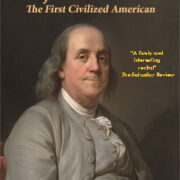Benjamin Franklin, the First Civilized American by Phillips Russell
Let it be said at once that this book, whatever its defects, is absorbingly interesting.
The author, obviously, is thoroughly acquainted with Franklin literature and has had access to a great mass of unpublished material. But in a sense it is not a biography. Rather it is a picture, an excellent pen-picture, which even with its exaggerated light and shade may well give one a better understanding of the fascinating personality of America’s first diplomat, inventor and man of letters to say nothing of the many other things he was “first” in.
Franklin was essentially an unconventional character. He was never content to accept things as they were and always examined everything with his keen intelligence and more often than not, apparently, succeeded in rearranging facts in such new forms that they astounded the people of his generation. Many of his inventions, his humorous, semiphilosophical treatises, his excursions into common-sense diplomacy and his positive genius for publicity established precedents, whose originality it is hard now for us to realize, since they are very part and parcel of our present day American life. Source: The Michigan Review.
To read this ebook on a computer using Readium, or for Google Play Books, or iBooks on your tablet or iPad, download this epub format.
To read on a device from Amazon, here is the ebook in mobi format.
Directions on how to email this file to your device are here.
To add this mobi file to your Kindle for PC software to read the chapters on your computer, see these instructions .
The Kindle Personal Document Service allows teachers, or librarians to send a mobi file to up to 15 student Kindle email addresses at a time.
Thus the author makes a charge that Franklin’s popular “Poor Richard” maxims, the result of his hard work and somewhat unsuccessful early career, “well nigh drove out from the spirit of the American people all tendency to a love for leisure and a cultivation of the graceful arts, made it its literature didactic, and its arts timid.” In fact, “it established a rock of philosophic materialism.” This may, in a measure, be true, but one suspects that his maxims were a symptom rather than a cause. Certainly Franklin, as the author is careful to point out, was not entirely successful in following his own precepts, or even the thirteen principles of the art of virtue, which it is suggested were perhaps inspired by Franklin’s hottest appreciation of his own defects.
But Franklin’s frailties as set forth by the author are very human. Certainly they do not seriously impair the true measure of his greatness or achievement. If he was fond of women, he was frank about it and if his whimsical humor was sometimes broad, it was more often than not, utilized to further the essentials of Franklin’s philosophy to “do good.” When one realizes how unbelievably limited were the intellectual resources in the colonies when Franklin began his career as a printer’s apprentice in Boston, the story of his rise to such heights as a world figure in the most cultured center of Europe has more the quality of romance than reality. During his ten-year stay in Paris he became the idol of the intellectuals. His face in bronze and marble was everywhere and his fame was only shared with Voltaire. The two met as guests of honor at a meeting of the French Academy of Sciences where they embraced one another at the insistent demand of the members. Yet with all this honor he remained the same whimsical, tolerant spirit, making love to many younger women, carrying on his experiments, running hs own interpretative printing press at Passy and wheedling millions of francs out of the French Government for the benefit of his native land.
Over half this book is devoted to Franklin’s earlier life and struggles. The real achievements of his career are sketched, sometimes summarily, in the later chapters, yet it is a merit of this book that the author manages in good measure to reveal the fundamental reasons for his rise to a position as one of the great men of his times.
Publishers have brought the book out in a most attractive form. The illustrations are well chosen and in many cases new and include reproductions of a number of interesting letters.
From a review in The Michigan Alumnus, Volume 33, 1927.
(Publisher’s Note: The first text which the reader will see is “A Prefactory Catechism,” a term we don’t see too often. Essentially it is four pages of questions and answers about the basic facts of Franklin’s life. Don’t let unusual feature stop you from enjoying the book. The writer makes Franklin and his times come alive in the chapters which follow.)



Leave a Reply
Want to join the discussion?Feel free to contribute!